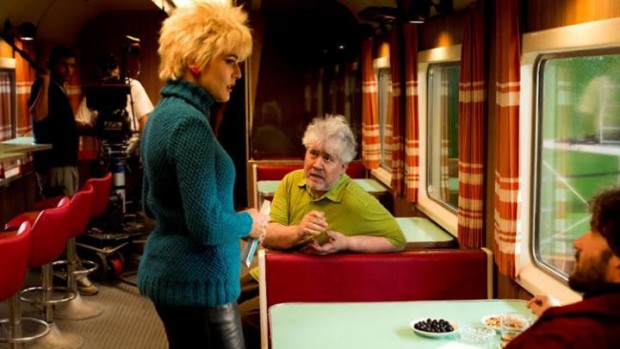
Writer| Director: Pedro Almodovar Stories: Alice Munro
Cast: Emma Suarez, Adrian Ugarte, Dario Grandinetti, Rossy de Palma
110min | Drama | Spain
JULIETA, which screens at the 69th Cannes Film Festival, is Almodovar’s fifth Palme D’Or hopeful since he started wooing the coveted trophy back in 1999 with All about My Mother; winning Best Director. Volver (2006) went on to garner Best Script and Best Actress; in 2009 Broken Embraces came away empty-handed from the competition;, in 2011 The Skin I Live In bagged him the Youth Award and his festival opener in 2004 was Bad Education.
His latest, and certainly his most ambitious film to date, is a peripatetic melodrama loosely based on three tales by Canadian Nobel prize winner Alice Munro about motherhood and loss suffered by its central character Julieta played by Adriana Ugarte and Emma Suarez – in youth and in middle age respectively. Men are merely sidekicks in this sorrowlful saga that pulls out all the stops in its Palme D’Or quest: referencing Almodovar’s highbrow cultural credentials : a sweeping orchestral score from Alberto Iglesias that vigorously drives the narrative forward, capable performances from an all-Spanish cast embracing stars and newcomers; atmospheric and unusual Spanish locations, tributes to Hitchcock and Patricia Highsmith and even classic works of art from the Prado, amongst other flourishes. But the watchword here is melodrama: after the frivolity of I’m So Excited, JULIETA plays out like a Greek tragedy: its tortured heroine teaches Greek language and culture, falls spectacularly in love, gives birth to a cherished daughter and goes on to suffer tragic loss. But the often ambiguous narrative stumbles over plotholes and implausibilities, making so many demands on its audience that by the end one feels exhausted, overwhelmed and even perplexed. With the best of intentions, Almodovar has thrown all his tricks into the mix and come up with a meaty but passionless potboiler. That’s not to say JULIETA is a flop, but it feels rushed and urgent – despite its generous running time – rather than well-paced and satisfying. And Julieta is the only fleshed out character in a cast that is, for the most part, underwritten and one-dimensional, merely existing to serve its heroine.
The film takes the form of a story within a story that opens in contempo Madrid. Julieta is in her fifties and planning a move to Portugal with her partner Lorenzo, when a chance encounter with an old friend brings her surprise news of a recent meeting with her daughter Antia and her three children, whom she bumped into during the holidays. Only afterwards does it emerge that her only Antia, her only daughter, is no longer a part of Julieta’s life, having disappeared in her late teens. But once she discovers that Antia is still alive and aware that she herself lives in Madrid, Julieta is devastated. Canclling her plans to move to Portugal with Lorenzo (Dario Grandinetti from Talk to Her), she moves back into the old flat where she raised Antia, in Madrid’s Barrio Gotico.
Closeted in Antia’s childhood home, she spills out her emotions in a desperate letter to her daughter, as the film’s narrative gradually fragments into flashbacks informing us of the past; the ’80s see a young Julieta with punkish hair and wacky earrings taking a romantic train journey that ends in torrid sex with a tousled-haired married fisherman called Xoan (Daniel Grau). As they make love a wild buck symbolically canters past their carriage in the swirling snow.
Some time later, in another of the film’s extraordinary coincidences, Julieta chances upon Xoan’s Belle Epoch seaside villa in Galicia when he just happens to be at his wife’s funeral. His hostile housekeeper (Rossy de Palma rocking a grey Afro wig) petulantly serves coffee but Xoan’s is overjoyed to welcome Julieta their daughter – cue more torrid sex. Ava (Inma Cuesta), another ex-lover who channels her unrequited love for Xoan into weird neolithic priapic figurines, becomes Antia’s confidante, while the contented couple raise their daughter by the stormy sea in scenes reminiscent of Hitchcock’s Marnie superbly captured in DoP Jean-Claude Larrieu’s luminous visuals.
A sejourn with Julieta’s parents in their country farm provides further family background but only to sadly inform us that her garden gnome-like father (Joaquin Notario) has taken up with a Moroccan peasant girl, while her mother shrivels away in a locked bedroom. Returning to the seaside, more tragedy awaits Julieta amidst heavy weather, echoing one of the film’s various leitmotifs.
Antia’s growing years are variously played by Ariadna Matin, Priscilla Delgado and Blanca Pares, but she never really gains depth as the character who, we are led to believe, has such a momumental impact on her emotionally broken mother. And In the final dénouement, Julieta appears shocked as a reaction to her own shattered ego and narcissistic expectations, rather than as a result of a passionate and intense love for her only daughter. This leaves us feeling underwhelmed and rather irritated with her as on once again, the doting Lorenzo is wheeled into place with a tray of tea and sympathy for the self-pitying Julieta, who clutches on to him for self-serving supoort rather than in a re-awakening of love and passion. Ultimately JULIETA is a film that has been so indulged with cult references, stylistic embellishments and tributes that it often feels unwieldy and hollow overstaying its welcome despite a reasonable running time. That said, its certainly worth a watch for its Hitchcockian overtones. MT